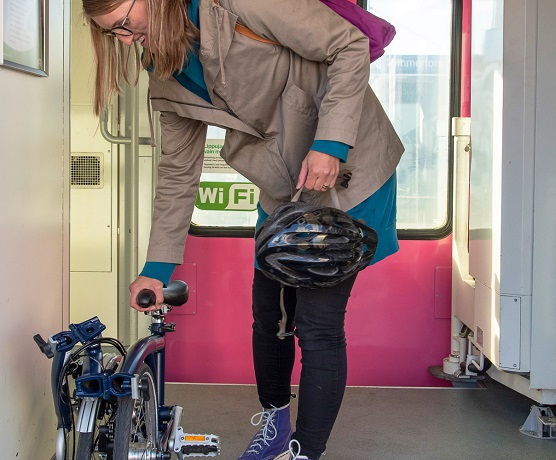
A folding bicycle fits into a small space on the train. © Marjo Aspegren
The Canemure subproject of the Tampere City Region pilots sustainable travel chains. The first pilot to be launched was the trial of folding and electric bikes in Orivesi in September.
Almost one in four people who live in Orivesi and are in working life commute to Tampere. The train and bus connections are good, but there is no internal feeder traffic. Most people choose to drive their own cars, particularly if they live several kilometres from the station. Improving the attraction of the travel chain is a key to reducing the climate burden caused from transportation.
Orivesi wanted to increase feeder traffic by bike. In August, volunteers were sought to try taking a bike to the train station, the train stop in the centre of Orivesi, or bus stops. Folding bikes were offered to those needing a bike in both Orivesi and Tampere, and electric bikes to those who considered their trip from home to the station too long to take on an ordinary bike. The selected volunteers received the bikes for a free-of-charge testing of at least three weeks.
"Ordinary bikes are, of course, an excellent form of transportation for many. However, folding bicycles are easier to carry around, whereas electric bikes encourage the user to ride a bike, even if the journey is long and hilly, if they don’t want to sweat before going to work, or if their fitness or motivation are not high enough for biking", explains Project Manager Sanna Ovaska from the City of Tampere.
The intention is not to replace the trips already made on bike with the experimental bikes, but rather to allow those who are now driving a car to have a sustainable travel chain.
Planning to buy a bike
One of those testing the folding bike was Miia Saarinen, who lives in Orivesi and works in Tampere. For three weeks, she rode her borrowed bike to the train station, folded it up, stepped onto the train, and unfolded it in Tampere to cycle to her work.
Before the pilot project, Saarinen drove to work in her car or took the train, depending on her shifts. She also stored her own bike at Tampere railway station. However, concerns about vandalism towards her bike and bike thefts discouraged her from taking the train. She is less than excited about the idea of leaving her bike at the station overnight or for the weekend, and taking the bike on the train costs more than her own train ticket from Orivesi to Tampere.
The Canemure folding bike project was, therefore, right on target for Saarinen. She had considered a folding bicycle before, and the experiment ensured her about how handy they are. "A good folding bike is quite an investment, and without trying one, you can’t be sure whether it is suitable for your use", Saarinen says.
For her, the folding bike was excellent, and it encouraged her to take the train. Folding bikes can be taken onto the train free of charge. She also praises the feel of the bike: riding it feels like riding an ordinary bike, but it is still foldable. She is now seriously considering buying her own folding bike. "The three weeks made me even more excited about the idea, and I keep browsing used bikes every week."
Saarinen even has suggestions for the improvement of the travel chains: "The combination of bus departures needs improvement, and a direct light traffic route could be made along the tracks to the centre of Orivesi. Folding bikes could also be made available for a deposit, combined with a monthly ticket for the bus or train."
Combination of infra improvements and traffic guidance
The Orivesi pilot project is one of the Canemure actions in the Tampere City Region. The first volunteers have now finished their cycling experiment, and will continue cycling even in winter.
The aim is to find solutions for feeder traffic. Depending on the area, solutions could include new kinds of mobility services, infra improvements, or communications, most often a combination of all three. "The guidance of transportation is important. Marketing, communications, and various experiments encourage people to change their habits. Large investments are not always necessary, as the most important thing is to get the missing piece of the travel chain to fall in place", says Sanna Ovaska.
Further information
- Sanna Ovaska, Project Manager, City of Tampere, firstname.lastname@tampere.fi